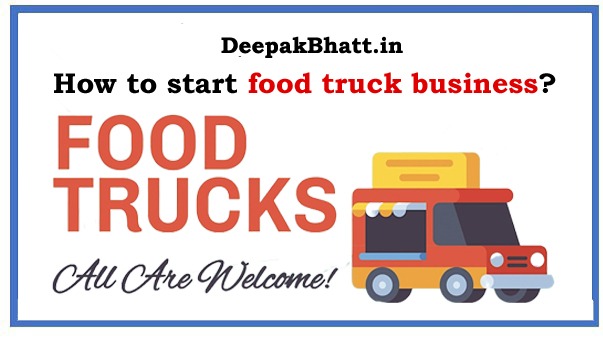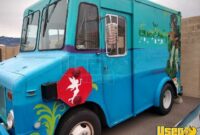Cost To Start A Food Truck: Your Comprehensive Guide to Financial Planning pickup.truckstrend.com
The aroma of sizzling street food, the vibrant artwork on a mobile kitchen, and the freedom of serving your culinary creations directly to hungry patrons – the dream of owning a food truck is incredibly appealing. It promises lower overheads than a traditional brick-and-mortar restaurant and the flexibility to chase events and crowds. However, beneath the romanticized vision lies a significant financial undertaking. Understanding the true cost to start a food truck is the critical first step in transforming that dream into a sustainable reality.
This comprehensive guide will demystify the various expenditures involved, providing a realistic breakdown of the initial investment required. From the vehicle itself to permits, equipment, and crucial operational buffers, we’ll cover every aspect you need to consider to budget effectively and navigate your journey into the bustling world of mobile gastronomy.
Cost To Start A Food Truck: Your Comprehensive Guide to Financial Planning
The Food Truck Itself: The Cornerstone of Your Investment
Undoubtedly, the most substantial portion of the cost to start a food truck is the vehicle itself and its conversion into a functional kitchen. This isn’t just about buying a truck; it’s about acquiring a fully equipped, mobile commercial kitchen.
- New Food Truck (Custom Build): This option offers complete customization, from the layout of your kitchen to the branding on the exterior. You’ll get a brand-new engine, chassis, and all-new equipment with warranties. While offering peace of mind and tailored design, this is the most expensive route.
- Cost Estimate: $80,000 – $150,000+
- Used Food Truck (Pre-built): A more budget-friendly choice, used trucks can significantly reduce your upfront investment. You might find a vehicle already equipped, or one that needs minor modifications. The challenge lies in thoroughly inspecting the vehicle’s mechanical condition and the age/condition of the existing kitchen equipment. You might save on the initial purchase but incur costs for repairs or upgrades.

- Cost Estimate: $30,000 – $80,000
- Food Truck Shell (New or Used) + Custom Build-Out: This involves purchasing a truck (new or used) and then hiring a specialized company to custom-build the kitchen inside. This offers a balance between cost and customization, allowing you to design your ideal workflow while potentially saving on the vehicle’s base price. The build-out itself includes installing all plumbing, electrical, ventilation, and safety features required by health codes.
- Cost Estimate (Shell): $15,000 – $50,000
- Cost Estimate (Build-out): $30,000 – $100,000+ (depending on complexity and equipment)

Important Consideration: Don’t forget the cost of truck wraps or custom paint jobs for branding. A professional wrap can cost anywhere from $3,000 to $10,000+, but it’s a moving billboard for your business.

Essential Equipment Costs
Beyond the truck’s shell, you need the right tools to cook, store, and serve your food. These are the workhorses of your mobile kitchen and contribute significantly to the cost to start a food truck.
- Cooking Equipment: Griddles, fryers, ovens, stovetops, charbroilers – chosen based on your menu.
- Refrigeration & Freezing: Commercial-grade refrigerators and freezers (under-counter, stand-up, or prep tables with refrigeration).
- Sinks: Required by health departments (typically three-compartment sink for washing, rinsing, sanitizing, plus a separate handwashing sink).
- Ventilation System: Crucial for safety and compliance, including a hood, exhaust fan, and fire suppression system.
- Generator: To power all your equipment when not connected to shore power. Size and fuel type (propane, diesel) will impact cost.
- Propane Tanks: If your cooking equipment runs on propane.
- Water Tanks: Fresh and greywater tanks for your sinks.
- Point-of-Sale (POS) System: Tablet-based systems are popular for their mobility and ease of use.
- Smallwares: Pots, pans, utensils, cutting boards, food storage containers, knives, safety equipment (fire extinguisher).
Cost Estimate: $10,000 – $50,000 (can sometimes be included in the build-out cost of a new truck).
Permits, Licenses, and Legal Fees
Navigating the bureaucratic landscape is a non-negotiable part of the cost to start a food truck. Regulations vary widely by state, county, and even city, making this a highly localized expense. It’s crucial to research your specific operational areas thoroughly.
- Business Registration/License: To legally operate your business.
- Health Department Permits & Inspections: This is paramount. Your truck must meet strict health and safety codes, often requiring multiple inspections (plan review, pre-operational, ongoing). You’ll need a commissary kitchen agreement in most areas, too.
- Food Handler Permits/Manager Certification: For you and any employees.
- Fire Marshal Inspection & Permit: Ensuring your cooking equipment and fire suppression systems are safe and up to code.
- Zoning Permits: Some cities have specific zones where food trucks can operate or require special permits for certain locations.
- Vehicle Registration & Commercial Driver’s License (CDL): Depending on the size and weight of your truck, a CDL might be required.
- Legal Counsel: Advisable for reviewing contracts (commissary, event agreements), setting up your business entity (LLC, S-Corp), and understanding local regulations.
Cost Estimate: $500 – $5,000 (can be higher in complex regulatory environments).
Initial Inventory and Supplies
Before you can serve your first customer, you need ingredients and packaging. This initial stock is a vital part of your upfront cost to start a food truck.
- Food Ingredients: Your initial purchase of all the raw materials needed for your menu.
- Packaging: Disposable containers, plates, cups, napkins, cutlery, bags – branding on these items can add to the cost.
- Cleaning Supplies: Detergents, sanitizers, gloves, paper towels, mop, buckets – essential for maintaining hygiene.
- Uniforms: If you plan on having branded uniforms for staff.
Cost Estimate: $1,000 – $5,000 (depending on menu complexity and initial volume).
Insurance: Protecting Your Investment
Insurance is not just a good idea; it’s a necessity and often legally required. It protects your business from unforeseen circumstances and is a recurring, but essential, cost to start a food truck.
- Commercial Auto Insurance: Covers your truck as a commercial vehicle, including accidents.
- General Liability Insurance: Protects against claims of injury or property damage caused by your business (e.g., a customer tripping over a cable).
- Product Liability Insurance: Crucial for food businesses, covering claims related to foodborne illness or allergic reactions.
- Workers’ Compensation Insurance: If you plan to hire employees.
- Property Insurance: Covers damage to your equipment.
Cost Estimate: $2,000 – $5,000 annually (often paid upfront for the first year).
Marketing and Branding
Getting the word out about your delicious offerings is vital. While some marketing can be low-cost, initial branding efforts are part of the cost to start a food truck.
- Logo Design: Professional logo that reflects your brand.
- Menu Design: Clear, attractive menus for your truck and online.
- Website/Social Media Setup: Basic website and professional social media profiles.
- Truck Wrap/Signage: As mentioned, a significant visual marketing tool.
- Initial Promotions: Grand opening specials, flyers, local advertising.
Cost Estimate: $500 – $10,000 (a professional truck wrap can be the largest component here).
Working Capital / Operating Reserves
Often overlooked, having sufficient working capital is crucial for the long-term success of your food truck. This isn’t an upfront cost for an asset, but rather a financial buffer to cover initial operating expenses before consistent revenue streams are established.
- Fuel: For the truck and generator.
- Commissary Kitchen Rent: Most health departments require food trucks to operate out of a certified commercial kitchen for prep, storage, and waste disposal.
- Staff Wages: If you hire help from day one.
- Utilities: For your commissary kitchen.
- Maintenance & Repairs: Unexpected truck or equipment breakdowns.
Practical Advice: Aim to have at least 3-6 months’ worth of operating expenses in reserve. This provides a safety net during slow periods or unexpected events.
Cost Estimate: $5,000 – $20,000
Unexpected Costs & Contingencies
No matter how meticulous your planning, unforeseen expenses will arise. Budgeting for contingencies is a smart financial move and a necessary part of the cost to start a food truck. This could include:
- Higher-than-expected permit fees.
- Minor truck repairs discovered during initial use.
- Marketing campaigns that cost more to yield results.
- Ingredient price fluctuations.
- Delays in opening, leading to longer periods without revenue.
Practical Advice: Always add 10-15% to your total estimated budget for contingencies.
Practical Advice and Actionable Insights
- Research Thoroughly: Understand local regulations, market demand, and competition before committing.
- Create a Detailed Business Plan: This isn’t just for investors; it’s your roadmap, forcing you to think through every aspect, especially finances.
- Seek Professional Advice: Consult with an accountant to understand tax implications and financial projections, and a lawyer for business structure and contract review.
- Start Small, Scale Up: Consider a smaller, less expensive truck or even a food trailer initially, and upgrade as your business grows.
- Explore Financing Options: Small business loans, equipment financing, or even crowdfunding can help cover the significant upfront costs.
- Network: Connect with other food truck owners. They are a valuable source of practical advice and cost-saving tips.
- Negotiate: Don’t be afraid to negotiate prices with suppliers for equipment and ingredients.
Comprehensive Food Truck Startup Cost Table
This table provides estimated ranges for the various components of the cost to start a food truck. Please note that these are general estimates and actual costs can vary significantly based on location, choices, and market conditions.
| Cost Category | Description | Estimated Low Range | Estimated High Range |
|---|---|---|---|
| The Food Truck Itself | |||
| New Custom-Built Truck | Chassis, engine, and full kitchen build-out, new equipment. | $80,000 | $150,000+ |
| Used Pre-built Truck | Existing truck with kitchen, may require upgrades/repairs. | $30,000 | $80,000 |
| Truck Shell + Custom Build-Out | Purchase truck separately, then customize kitchen. | $45,000 | $120,000+ |
| Equipment & Build-Out | |||
| Cooking Equipment | Griddles, fryers, ovens, stoves, charbroilers (if not in pre-built truck). | $5,000 | $25,000 |
| Refrigeration/Freezing | Commercial refrigerators, freezers, prep tables. | $3,000 | $15,000 |
| Sinks & Plumbing | 3-compartment sink, handwashing sink, water heater, pumps, tanks. | $2,000 | $8,000 |
| Ventilation & Fire Suppression | Hood, exhaust fan, fire suppression system. | $5,000 | $15,000 |
| Generator | To power electrical equipment. | $1,500 | $10,000 |
| Propane Tanks | For gas-powered equipment. | $500 | $1,500 |
| POS System | Tablet, printer, cash drawer. | $500 | $2,500 |
| Smallwares & Utensils | Pots, pans, knives, cutting boards, serving utensils. | $500 | $2,000 |
| Permits, Licenses & Legal | |||
| Business Registration/Licenses | State & local business permits. | $100 | $500 |
| Health Department Permits | Inspections, plan review, annual fees. | $200 | $2,000 |
| Food Handler Certifications | For owner/employees. | $50 | $300 |
| Fire Marshal Permit | Inspection & annual fees. | $100 | $500 |
| Vehicle Registration/CDL | Commercial vehicle registration, potential CDL training/fees. | $100 | $1,000 |
| Legal Counsel | Business formation, contract review. | $500 | $2,000 |
| Initial Inventory & Supplies | |||
| Food Ingredients | First stock of raw materials. | $1,000 | $5,000 |
| Packaging & Disposables | Containers, plates, napkins, cutlery. | $500 | $2,000 |
| Cleaning Supplies | Soaps, sanitizers, towels, mop. | $100 | $500 |
| Insurance | |||
| Commercial Auto Insurance | Annual premium for truck. | $1,000 | $3,000 |
| General & Product Liability | Annual premium for business operations. | $1,000 | $2,000 |
| Workers’ Compensation (if applicable) | Annual premium if hiring employees. | $500 | $2,000 |
| Marketing & Branding | |||
| Truck Wrap/Paint | Professional vehicle branding. | $3,000 | $10,000 |
| Logo/Menu Design | Professional design services. | $300 | $1,500 |
| Website/Social Media Setup | Basic online presence. | $100 | $1,000 |
| Working Capital/Reserves | |||
| 3-6 Months Operating Expenses | Fuel, commissary rent, initial wages, utilities. | $5,000 | $20,000 |
| Contingency Fund | 10-15% of total budget for unexpected costs. | $5,000 | $15,000 |
| TOTAL ESTIMATED COST | (Sum of all categories, highly variable) | $50,000 | $250,000+ |
Frequently Asked Questions (FAQ) About Food Truck Startup Costs
Q1: What is the absolute minimum I can expect to spend to start a food truck?
A1: While the table shows a low end of $50,000, achieving this would require significant compromises, such as purchasing a very old, pre-owned truck that might need immediate repairs, doing much of the work yourself, and operating in a low-regulation area. A more realistic minimum for a viable, legally compliant operation is often closer to $60,000 – $70,000.
Q2: Can I get a loan to cover the cost to start a food truck?
A2: Yes, many entrepreneurs finance their food truck ventures. Options include SBA loans, traditional bank loans, equipment financing, and even crowdfunding. Having a solid business plan and good credit history will significantly improve your chances.
Q3: How long does it typically take to recoup the initial investment?
A3: This varies wildly based on your menu, pricing, operating hours, location, marketing effectiveness, and efficiency. Some successful trucks might see a return within 2-3 years, while others could take longer. Profitability is key, and unforeseen operating costs can extend this period.
Q4: Are ongoing costs cheaper for a food truck than a brick-and-mortar restaurant?
A4: Generally, yes, ongoing rent is significantly lower (replaced by commissary kitchen fees and parking/event fees). However, food trucks have unique ongoing costs like fuel, generator maintenance, and higher vehicle insurance. Labor, food costs, and marketing expenses can be similar.
Q5: Is it possible to start with a very basic setup, like a food cart or trailer, and upgrade later?
A5: Absolutely! Many successful mobile food businesses start with a simpler, lower-cost food cart or small trailer setup, especially for specific items like hot dogs, coffee, or desserts. This allows you to test your concept, build a customer base, and generate capital before investing in a full-sized food truck. The startup cost for a cart can be as low as $5,000 – $20,000.
Q6: What’s the biggest hidden cost I should be aware of?
A6: The biggest "hidden" costs are often related to unexpected repairs and regulatory compliance. An old truck might break down more often, and local health department requirements can be stringent and expensive to meet if not planned for meticulously. Always have a contingency fund.
Conclusion
Embarking on the journey of starting a food truck is an exciting prospect, offering a unique blend of culinary passion and entrepreneurial freedom. However, it’s crucial to approach it with a clear-eyed understanding of the financial commitment involved. The cost to start a food truck is a multi-faceted sum, encompassing the vehicle, equipment, permits, initial supplies, insurance, and essential working capital.
By meticulously planning and budgeting for each of these categories, you can minimize surprises, secure the necessary funding, and lay a strong foundation for your mobile culinary business. While the initial investment is substantial, with diligent preparation, a compelling menu, and a passion for serving delicious food, the rewards of owning your own food truck can be truly fulfilling. Your dream can indeed hit the road, but only when you’re financially prepared for the journey.



